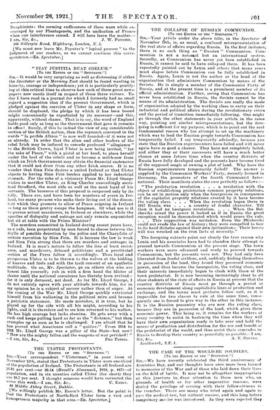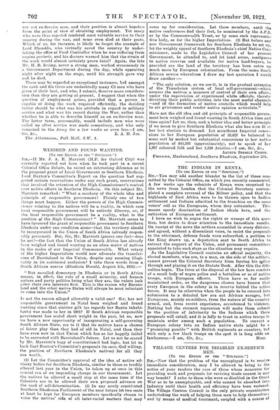THE CASE OF THE WOULD-BE SOLDIERS.
[To THE EDITOR OF THE " SPECTATOR."]
SIR, We have recently celebrated the third anniversary of Armistice Day, and our thoughts have once more been turned to memories of the War and of those who laid down their live, on the field of battle. It may not be altogether inappropriate at this juncture to ,draw attention to those men who, on grounds of health or for other imperative reasons, were denied the privilege of serving with their fellow-citizens in the trenches. There are many who tried again and again to pass the medical test, but without success, and this long before compulsory service was introduced. As they were rejected they
are not ex-Service men, and their position is almost hopeless from the point of view of obtaining employment. Yet many who were thus rejected rendered most valuable service to their country during the war, and some even died at their posts. Which of us, for instance, is likely to forget the example of Lord Rhondda, who virtually saved the country by under- taking the office of Food Controller when he was suffering from angina pectoris, and his doctors warned him that the strain of the work would almost certainly prove fatal? Again, the late Mr. H. B. Irving, never a strong man, worked strenuously in a Government Department during the day, while appearing night after night on the stage, until his strength gave way and he died.
These may be regarded as exceptional instances, but amongst the rank and file there are undoubtedly many C3 men who have given of their best, and who, I submit, deserve more considera- tion than they are getting at present. I suggest that when the question of employment arises, provided that a person is capable of doing the work required efficiently, the deciding factor should be what was his attitude in regard to military service and what was his record during the War, rather than whether he is able to describe himself as an ex-Service man. The latter term, presumably, would include men who were called up after service was made compulsory, and who only remained in the Army for a few weeks or even less.—I am,
Sir, &e., E. A. H. JAY. The Athenaeum, Pall Mall, S.W. 1.











































 Previous page
Previous page